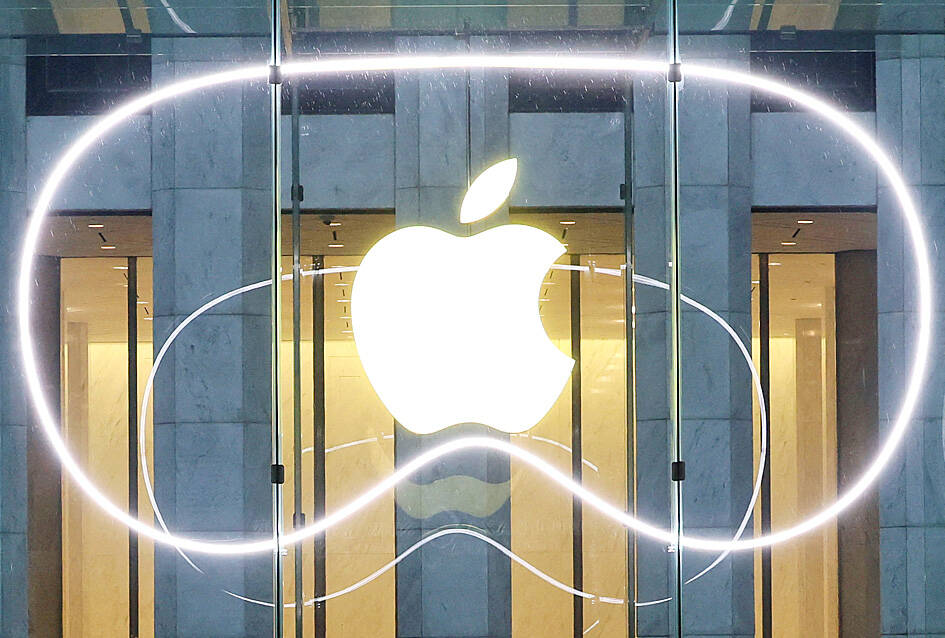Apple Inc is canceling a decade-long effort to build an electric vehicle (EV), people with knowledge of the matter said, abandoning one of the most ambitious projects in the history of the firm.
Apple made the disclosure internally on Tuesday, surprising about 2,000 employees working on the project, the sources said.
The decision was shared by Apple chief operating officer Jeff Williams and Kevin Lynch, a vice president in charge of the effort, the sources said.

Photo: Reuters
The two executives told staff that the project would begin winding down and that many employees on the EV team — known as the Special Projects Group — would be shifted to the artificial intelligence (AI) division under executive John Giannandrea.
Those employees would focus on generative AI projects, an increasingly key priority for the firm.
Ultimately, focusing on AI might be a better bet, Bloomberg Intelligence analysts Anurag Rana and Andrew Girard said in a note.
“Apple’s decision to abandon electric cars and shift resources toward generative AI is a good strategic move, we believe, given the long-term profitability potential of AI revenue streams versus cars,” Rana and Girard said.
Under the new arrangement, Lynch would report to Giannandrea, the sources said.
He previously reported to Williams, who also has overseen software engineering for the Apple Watch.
Apple declined to comment.
The move came as a relief to investors, who sent Apple shares climbing on Tuesday and closing up about 1 percent at US$182.63 in New York.
Tesla Inc head Elon Musk also celebrated the move.
He shared a post on X with a saluting emoji and a cigarette.
The decision to ultimately wind down the project is a bombshell for the company, ending a multibillion-dollar effort called Project Titan that would have vaulted Apple into a whole new industry.
The tech giant started working on an EV in about 2014, setting its sights on a fully autonomous vehicle with a limousine-like interior and voice-guided navigation.
However, the project struggled nearly from the start, with Apple changing the team’s leadership and strategy several times.
Lynch and Williams took charge of the undertaking a few years ago — following the departure of Doug Field, now a senior executive at Ford Motor Co.
Apple was still years away from producing a vehicle and contemplated many different designs. Beyond the look of the vehicle, cracking self-driving technology was a major challenge. Apple had road-tested its system since 2017 using a Lexus SUV exterior, putting dozens of vehicles on roads in the US.
The firm also tested more secretive components on a gigantic track in Phoenix, Arizona, that was once owned by Chrysler.
In the end, Apple was facing a cooling market for EVs. Sales growth lost steam in the past few months after high prices and a lack of charging infrastructure discouraged mainstream buyers from shifting to all-electric vehicles.
General Motors Co and Ford are pivoting to producing more hybrid vehicles after confronting lackluster EV demand and manufacturing bottlenecks, and vehicle manufacturers across the industry are slashing prices for battery-electric vehicles, production targets and profit forecasts.
Even Tesla, the pioneer of the EV revolution in the US, has said its rate of expansion would be “notably lower” this year.
Domestic EV sales growth would decelerate to 11 percent this year from an estimated 47 percent growth rate last year, a forecast by UBS AG said.

The US dollar was trading at NT$29.7 at 10am today on the Taipei Foreign Exchange, as the New Taiwan dollar gained NT$1.364 from the previous close last week. The NT dollar continued to rise today, after surging 3.07 percent on Friday. After opening at NT$30.91, the NT dollar gained more than NT$1 in just 15 minutes, briefly passing the NT$30 mark. Before the US Department of the Treasury's semi-annual currency report came out, expectations that the NT dollar would keep rising were already building. The NT dollar on Friday closed at NT$31.064, up by NT$0.953 — a 3.07 percent single-day gain. Today,

‘SHORT TERM’: The local currency would likely remain strong in the near term, driven by anticipated US trade pressure, capital inflows and expectations of a US Fed rate cut The US dollar is expected to fall below NT$30 in the near term, as traders anticipate increased pressure from Washington for Taiwan to allow the New Taiwan dollar to appreciate, Cathay United Bank (國泰世華銀行) chief economist Lin Chi-chao (林啟超) said. Following a sharp drop in the greenback against the NT dollar on Friday, Lin told the Central News Agency that the local currency is likely to remain strong in the short term, driven in part by market psychology surrounding anticipated US policy pressure. On Friday, the US dollar fell NT$0.953, or 3.07 percent, closing at NT$31.064 — its lowest level since Jan.

The New Taiwan dollar and Taiwanese stocks surged on signs that trade tensions between the world’s top two economies might start easing and as US tech earnings boosted the outlook of the nation’s semiconductor exports. The NT dollar strengthened as much as 3.8 percent versus the US dollar to 30.815, the biggest intraday gain since January 2011, closing at NT$31.064. The benchmark TAIEX jumped 2.73 percent to outperform the region’s equity gauges. Outlook for global trade improved after China said it is assessing possible trade talks with the US, providing a boost for the nation’s currency and shares. As the NT dollar

The Financial Supervisory Commission (FSC) yesterday met with some of the nation’s largest insurance companies as a skyrocketing New Taiwan dollar piles pressure on their hundreds of billions of dollars in US bond investments. The commission has asked some life insurance firms, among the biggest Asian holders of US debt, to discuss how the rapidly strengthening NT dollar has impacted their operations, people familiar with the matter said. The meeting took place as the NT dollar jumped as much as 5 percent yesterday, its biggest intraday gain in more than three decades. The local currency surged as exporters rushed to